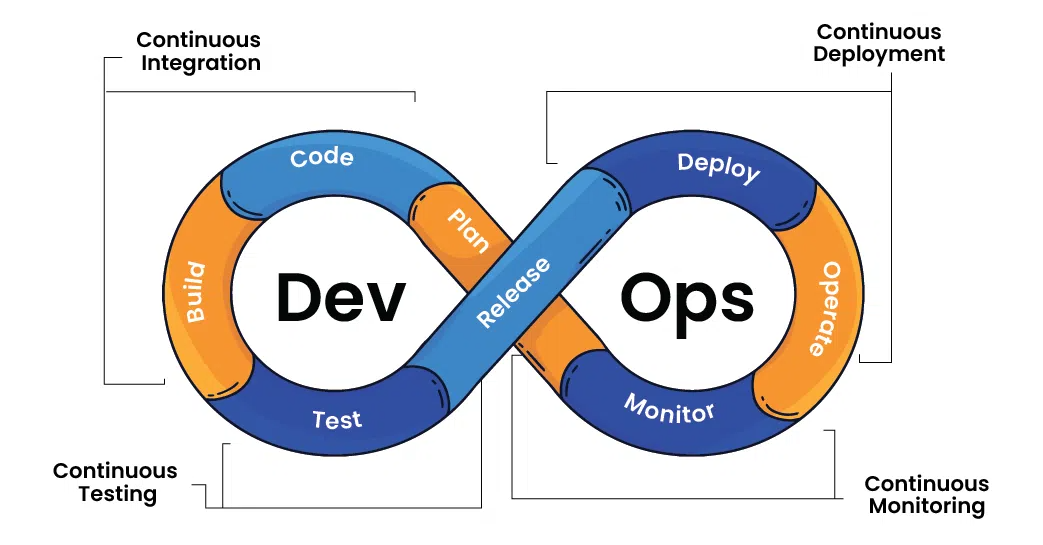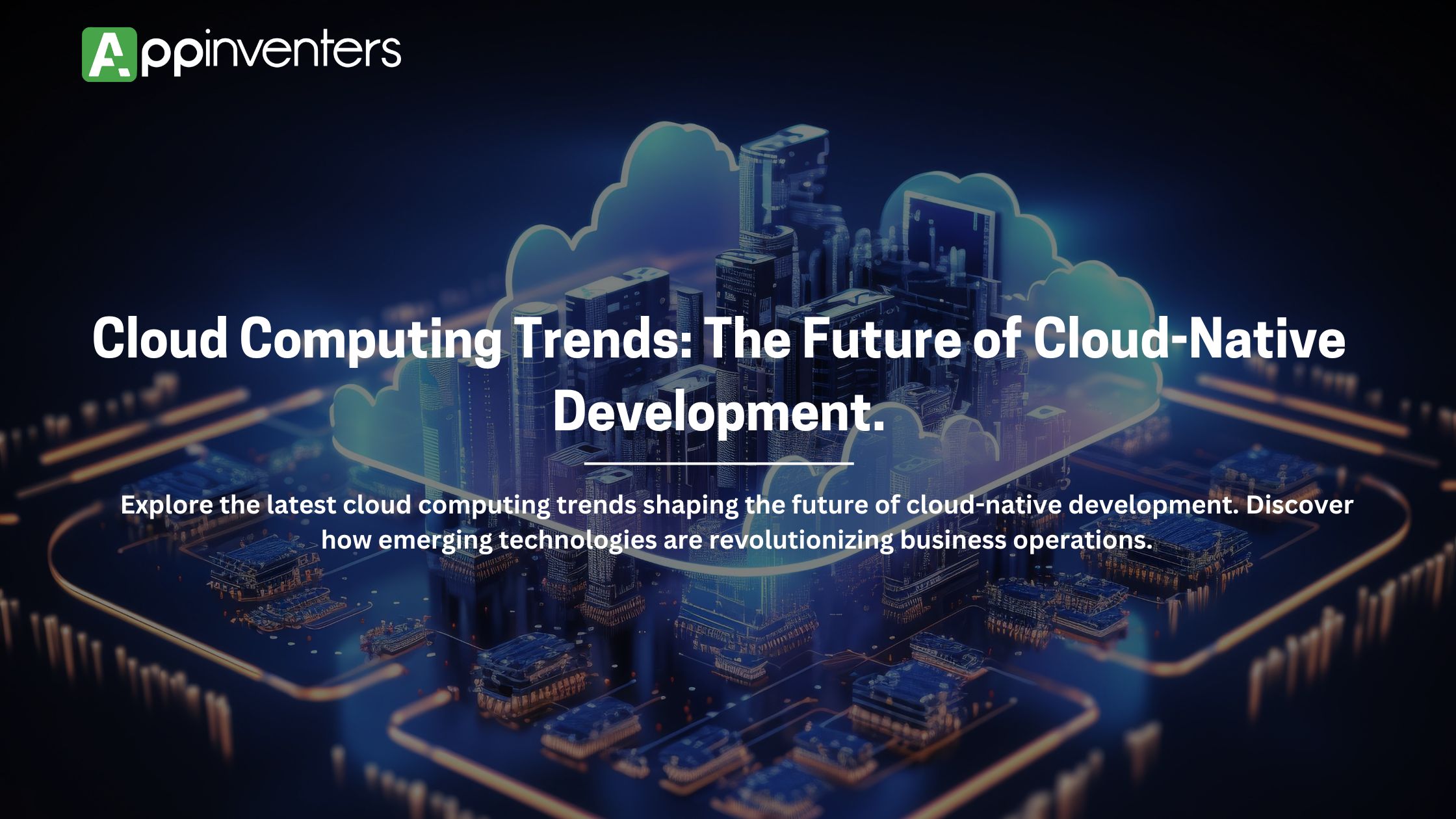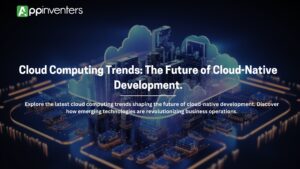I. Overview
A. DevOps definition
A technical and cultural trend called “DevOps,” a combination of “Development” and “Operations,” aims to eliminate divisions between software development and IT operations. It places a strong emphasis on these historically distinct teams working together, communicating, and integrating throughout the software development lifecycle. To increase productivity and streamline procedures, Top DevOps Company Appinventers is here, it encourages the use of techniques like automation, infrastructure as code, continuous integration, and continuous delivery.
B. The significance of DevOps in relation to contemporary software development
DevOps has become essential in today’s rapidly changing digital landscape, as organizations are under increasing pressure to deliver software more quickly, more reliably, and with higher quality. It helps businesses to improve overall agility, shorten time-to-market for new products and updates, and quickly respond to market demands.
DevOps enables teams to accomplish continuous integration and delivery, guaranteeing that software is distributed fast and efficiently while preserving stability and reliability. It does this by promoting a culture of cooperation and automation. DevOps, in short, helps companies remain ahead of the curve in the ever-changing software development industry by facilitating faster innovation, more efficient value delivery to consumers, and improved competitiveness.
C. Summary of the content of the blog post
Appinventers explore the revolutionary field of DevOps and its significant influence on contemporary software development in this blog article. We’ll start by explaining DevOps and going over its fundamental ideas, explaining why it has grown to be a key component of modern software engineering.
We’ll then look at DevOps’ importance in the current software development environment. we’ll learn why DevOps has become a vital enabler of efficiency and innovation, from the difficulties with traditional development approaches to the demand for speed and agility in software delivery.
We’ll look at how DevOps transforms software development methods in the future. We’ll delve into the essential techniques and approaches that turn DevOps into a transformative experience for teams throughout the globe, ranging from automation and cooperation to continuous integration and delivery platforms.
Inspiring success stories from actual DevOps implementations will also be shared, showing how companies have used DevOps methods and principles to achieve outstanding outcomes.
But implementing DevOps is not without its difficulties. We’ll talk about the challenges and issues that businesses may run into while implementing DevOps, from technological complexity to cultural opposition, and we’ll offer helpful advice on how to get beyond these issues.
With an eye toward the future, we’ll examine the trends and advancements in DevOps, from the emergence of cloud-native and serverless architectures to the use of emerging technologies like artificial intelligence and machine learning. This will provide an overview of what’s next for the DevOps industry.
We’ll close by highlighting the transforming power of DevOps and urging readers to start their own DevOps journeys in order to achieve increased productivity, flexibility, and creativity in their software development projects.
II. Knowledge of DevOps
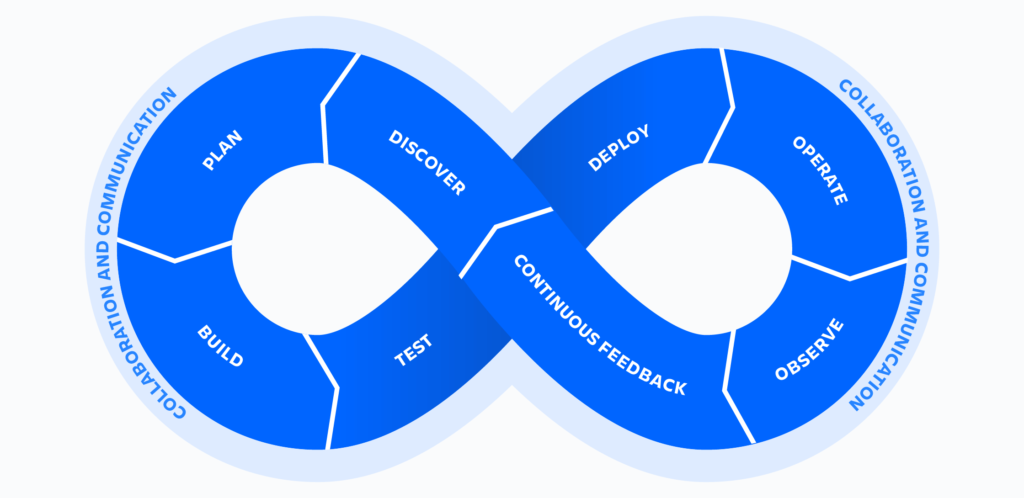
A. The History and Development of DevOps
We’ll delve into the history of DevOps and examine how it developed inside the software development sector. We’ll trace the history of DevOps and its impact on contemporary software engineering techniques, starting from the early days of agile development and lean principles and ending with the creation of the organization in response to the difficulties of isolated development and operations.
B. Core Principles of DevOps
By revealing the fundamental ideas of DevOps, we’ll explore the tenets that support this revolutionary methodology. We’ll analyze the fundamental ideas that characterize the DevOps concept and influence its use in businesses around the globe, from encouraging cooperation and communication to embracing automation and constant feedback loops.
C. Essential Elements of the DevOps Approach
Appinventers will examine the fundamentals of the DevOps methodology and analyze what makes it possible for businesses to successfully use the concepts of DevOps. We’ll break down the essential techniques and resources that enable teams to optimize development workflows, quicken delivery cycles, and foster creativity, from infrastructure as code (IaC) and configuration management to continuous integration (CI), continuous delivery (CD), and beyond.
III. Modern Software Development Requires DevOps

A. Difficulties with Conventional Software Development Methods
We’ll look at the drawbacks and restrictions of conventional software development approaches and the difficulties businesses have in producing effective, high-quality software. We’ll emphasize the drawbacks of conventional methods and the necessity for change, from divided development and operations teams to manual, error-prone processes and protracted release cycles.
B. Increasing Complexity of Software Systems
We’ll examine the growing scope and complexity of applications in today’s digital environment while navigating the complexities of contemporary software systems. We’ll shed light on the complexity that add layers of difficulty to software development and operations, demanding a more comprehensive and integrated strategy like DevOps. These challenges range from microservices architectures and distributed systems to the rise of APIs and cloud-native technologies.
C. The need for continuous deployment and continuous integration (CI/CD) and rapid delivery
In order to meet the demands of the market, we will examine the reasons why companies are adopting continuous integration/continuous deployment (CI/CD) and rapid release cycles. These practices are necessary to ensure high speed and agility in software delivery. We’ll emphasize the value of DevOps in helping businesses to generate value fast, iterate on feedback effectively, and stay ahead of the curve in today’s fiercely competitive environment as customer expectations change swiftly and competition heats up.
IV. How Software Development Processes Are Streamlined by DevOps
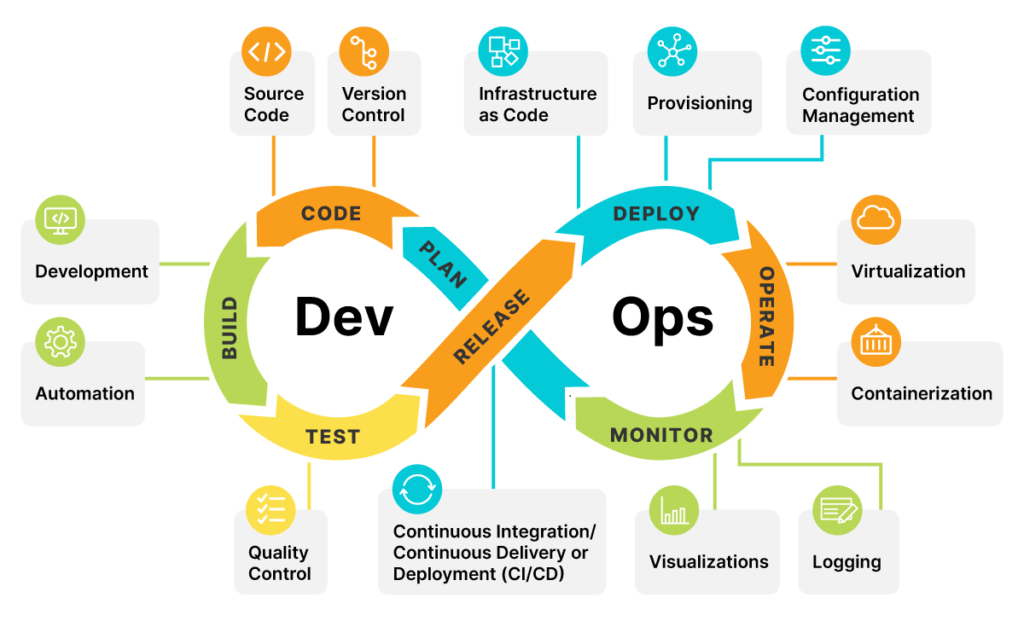
A. Automating Repeated Operations
We’ll explore the power of automation and see how DevOps uses it to automate tedious and repetitive operations, therefore streamlining software development. We’ll demonstrate how automation reduces human error, speeds up software release cycles, and frees up critical time and resources for everything from code compilation and testing to deployment and infrastructure provisioning.
B. The Development and Operations Teams’ Cooperation and Communication
We’ll examine how DevOps promotes a culture of teamwork and shared accountability between development and operations teams, emphasizing the value of collaboration and communication. DevOps facilitates seamless teamwork toward shared objectives by dismantling organizational barriers and encouraging cross-functional communication. This helps teams synchronize their efforts to more effectively and efficiently offer value to consumers.
C. Continuous Delivery, Pipelines for Integration and Deployment
We will investigate how DevOps helps companies to automate the process of developing, testing, and releasing software updates quickly and reliably as we unveil the potential of continuous integration, delivery, and deployment (CI/CD) pipelines. Teams can increase agility and responsiveness to market needs by implementing CI/CD pipelines, which can cut down on deployment risks, shorten feedback loops, and increase the frequency of software update iterations.
D. Infrastructure as Code (IaC) and Configuration Management
Discover how DevOps handles infrastructure as software by delving into the worlds of Infrastructure as Code (IaC) and configuration management. This allows businesses to manage and provision infrastructure resources programmatically. Software applications may be deployed consistently, scalable, and reliably in a variety of contexts thanks to DevOps’s automation of deployment procedures and codification of infrastructure configurations.
E. Monitoring and Feedback Loops for Continuous Improvement
Highlighting the importance of monitoring and feedback loops, we’ll explore how DevOps enables organizations to gather insights into the performance and reliability of software systems. By implementing robust monitoring solutions and establishing feedback mechanisms, teams can identify issues proactively, iterate on improvements iteratively, and drive continuous improvement in software quality and performance.
At APPINVENTERS, we stand as a top DevOps company, dedicated to helping businesses streamline their software development processes, enhance agility, and achieve faster time-to-market. With our proven methodologies and innovative solutions, we empower organizations to stay ahead in the dynamic world of software engineering.
V. Case Studies: Practical Demonstrations of DevOps Integration
A. Business A: Effective Integration of DevOps Techniques Resulting in Enhanced Deployment Frequency and Decreased Failure Rates
We’ll look at how Company A adopted DevOps methods to improve their software delivery skills by following their journey. Company A was able to increase deployment frequency significantly and reliably by implementing automation, CI/CD pipelines, and infrastructure as code. This allowed them to push upgrades to production more regularly. We’ll examine the tactics and difficulties they encountered along the road, emphasizing important takeaways and optimal procedures that facilitated their achievement.
B. Business B: Using DevOps to Boost Teamwork and Reduce New Feature Time-to-Market
By examining Company B’s experience, we will learn how they benefited from DevOps to promote cooperation between the development and operations teams and shorten the time it took to release new features. Company B was able to deliver value to consumers more quickly and reliably by streamlining their software development lifecycle, automating manual operations, and dismantling silos. We’ll examine the tactics they used and the results they obtained, demonstrating how DevOps had a revolutionary effect on their company.
C. Takeaways and Optimal Methodologies from These Case Studies
We will synthesize the findings from the two case studies and identify the most important takeaways and recommended procedures for a successful DevOps implementation. We will emphasize practical tactics and suggestions for companies starting their DevOps journey, from adopting automation and iterative feedback loops to cultivating a culture of cooperation and continuous development. Through analyzing the experiences of Company A and Company B, readers will obtain important knowledge on how to use DevOps to propel innovation, improve productivity, and realize commercial success.
VI. Adopting DevOps: Challenges and Considerations
A. Organizational Culture and aversion to Change
We’ll discuss how firms may be reluctant to adopt the cultural shift that DevOps demands because of their strong a version to change and mistrust of it. We’ll talk about tactics for overcoming opposition and developing a culture that embraces DevOps methods and concepts, from dismantling organizational barriers and encouraging collaboration to encouraging transparency and responsibility.
B. Integrating with Current Instruments and Procedures
We’ll explore the obstacles that organizations encounter while implementing DevOps smoothly, navigating the intricacies of integrating the technology with current tools and procedures. We’ll look at the challenges that impede integration efforts, from outmoded workflows and legacy systems to separate toolkits and incompatible technologies, and investigate how to get around them to maintain pipeline continuity and productivity in software development.
C. Security and Compliance Considerations
We’ll examine the difficulties in upholding security and compliance standards in a quickly changing software development environment, emphasizing the vital role that security and compliance play in the adoption of DevOps. We’ll go through the intricacies and factors that businesses need to take into account in order to reduce risks and preserve confidence in their DevOps processes, from overseeing access controls and protecting sensitive data to making sure they comply with regulations and following industry standards.
D. Skill Gaps and Training Needs
Recognizing the training requirements and skill gaps that come with adopting DevOps, we’ll look at the difficulties that organizations have in empowering their staff to grow and developing a culture of lifelong learning. We’ll talk about the various skill sets needed for a successful DevOps implementation, from technical proficiency in automation and cloud technologies to soft skills like teamwork and communication, and we’ll make suggestions for filling in skill gaps through initiatives like knowledge sharing, mentoring, and training programs.
VII. Upcoming Developments and Trends in DevOps
A. Development of DevOps Methodologies and Equipment
As DevOps methods and technologies continue to expand in the future, we’ll examine how these methodologies are changing to keep up with the ever-evolving demands of software development. We’ll cover the ways that DevOps practitioners are innovating to increase software systems’ dependability and scalability, streamline development pipelines, and foster collaboration. These innovations range from improvements in automation and orchestration to the adoption of DevSecOps principles and GitOps procedures.
B. Merging Emerging Technologies like AI and Machine Learning with DevOps
We will investigate how companies are using AI and machine learning to enhance and automate DevOps operations by examining the intersection of these technologies with DevOps. We’ll examine how artificial intelligence (AI) and machine learning can improve the effectiveness, dependability, and resilience of DevOps processes, allowing businesses to spur innovation and gain a competitive edge in the digital era. Applications range from automated testing and optimization to predictive analytics and anomaly detection.
C. DevOps in the Age of Serverless and Cloud-Native Architectures
We’ll examine how DevOps methods are changing to support the deployment and administration of cloud-native apps and microservices-based architectures as we delve into the implications of DevOps in the age of serverless and cloud-native architectures. We’ll talk about how DevOps helps businesses to take advantage of the scalability, agility, and cost-effectiveness of cloud-native technologies while preserving operational excellence and dependability in their software delivery pipelines. Examples of these technologies include containerization, Kubernetes orchestration, serverless computing, and event-driven architectures.
VIII. Conclusion
A. Synopsis of DevOps’ Significance in Contemporary Software Development
As we take stock of our trip thus far, we stress how important DevOps is to contemporary software development. In today’s fast-paced digital landscape, DevOps has become necessary. It began as a response to the shortcomings of traditional development processes and has evolved into a disruptive strategy that emphasizes collaboration, automation, and continuous improvement. Through process optimization, delivery cycle acceleration, and overall agility enhancement, DevOps enables enterprises to innovate more quickly, provide value to consumers more effectively, and maintain a competitive edge.
B. Advising Companies to Adopt DevOps Principles for Enhanced Productivity and Marketability
Appinventers strongly encourage enterprises to fully adopt DevOps methods and concepts in view of the transformative potential of this methodology. Organizations can achieve more efficiency, agility, and competitiveness in their software development endeavors by investing in continuous learning and improvement, adopting automation, and cultivating a culture of cooperation. The moment has come for organizations to embrace DevOps and leverage its revolutionary ability to drive innovation, deliver value, and prosper in the digital age. This applies to both new and existing processes.
If you’re seeking the top DevOps development company in India, look no further. Our team at APPINVENTERS boasts extensive expertise in DevOps practices, enabling us to transform your software development lifecycle and propel your business forward in today’s competitive landscape. we’re committed to helping businesses harness the power of DevOps to accelerate their digital transformation journey. As a best DevOps development company, we offer innovative solutions tailored to your specific needs. Whether you’re looking to streamline your software development processes or enhance collaboration between teams, we’re here to support you every step of the way. Contact us today to embark on your DevOps journey and unlock new possibilities for your business.
Frequently Asked Questions (FAQs)
DevOps is a methodology that integrates software development (Dev) with IT operations (Ops) to streamline the software delivery process. It’s important in modern software development because it promotes collaboration, automation, and continuous improvement, leading to faster and more reliable releases.
DevOps principles include:
Collaboration: Breaking down barriers between development and operations teams to foster communication and cooperation.
Automation: Automating manual tasks such as testing, deployment, and infrastructure provisioning to increase efficiency and consistency.
Continuous Integration (CI) and Continuous Delivery (CD): Implementing pipelines to continuously integrate and deliver code changes to production environments.
Monitoring and Feedback: Utilizing monitoring tools to gather insights into system performance and user experience for continuous improvement.
DevOps improves efficiency by:
Reducing manual processes through automation, which minimizes human errors and accelerates time-to-market.
Streamlining collaboration between development, operations, and other stakeholders, leading to faster problem-solving and decision-making.
Implementing CI/CD pipelines that enable rapid and reliable delivery of software updates, reducing cycle times and enhancing agility.
Providing real-time insights into system performance and user feedback, facilitating continuous improvement and optimization.
Automation is central to DevOps and serves several purposes, including:
Automating repetitive tasks such as code builds, testing, and deployment to increase efficiency and consistency.
Enabling the continuous integration and delivery of code changes, allowing teams to release software updates rapidly and reliably.
Automating infrastructure provisioning and configuration management, which enhances scalability, agility, and reliability.
Implementing automated monitoring and alerting systems to detect and respond to issues proactively, minimizing downtime and optimizing performance
The key principles of DevOps include:
Collaboration: Breaking down silos between development and operations teams to foster communication and cooperation.
Automation: Automating repetitive tasks such as testing, deployment, and infrastructure provisioning to increase efficiency and consistency.
Continuous Integration (CI) and Continuous Delivery (CD): Implementing CI/CD pipelines to continuously integrate code changes, test them, and deliver them to production environments quickly and reliably.
Monitoring and Feedback: Utilizing monitoring tools to gather feedback on system performance and user experience, enabling teams to make data-driven improvements.

